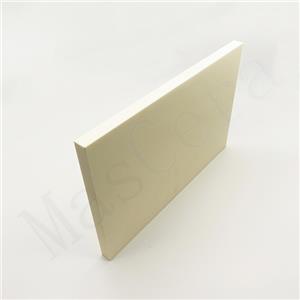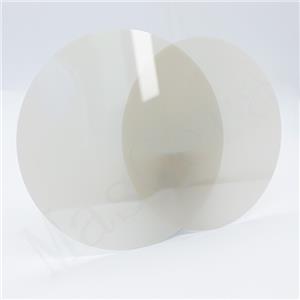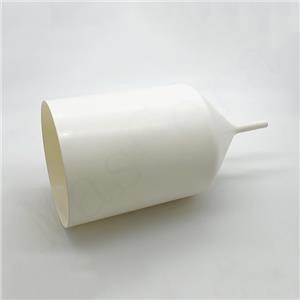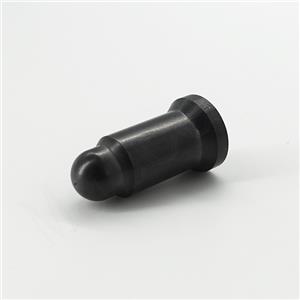Mechanical Properties of Technical Ceramics
The mechanical properties of ceramics have made technical ceramic materials increasingly important across various industries. Due to their outstanding hardness of ceramics, excellent wear resistance, chemical stability, and superior thermal performance, technical ceramic materials are often chosen to replace metals and polymers in extreme working environments. Industrial ceramic components are essential in applications that require structural strength, electrical insulation, and dimensional stability. Understanding the mechanical properties of ceramics is critical to selecting the right technical ceramic materials for high-performance industrial ceramic components.
Key Mechanical Properties of Ceramics
Flexural Strength: Flexural strength measures the ability of industrial ceramic components to resist bending forces without fracture. Technical ceramic materials like alumina and silicon nitride offer flexural strengths ranging from 300 MPa to 1200 MPa, making them ideal for load-bearing applications requiring superior mechanical properties of ceramics.
Hardness of Ceramics: Hardness is a defining characteristic of technical ceramic materials. The hardness of ceramics, typically between 1000 and 2000 HV, surpasses that of metals and engineering plastics. This high hardness of ceramics ensures excellent resistance to wear and deformation, making industrial ceramic components highly durable under abrasive conditions.
Fracture Toughness: Although technical ceramic materials are often considered brittle, innovations like transformation toughening in zirconia have improved the fracture toughness of industrial ceramic components. A strong understanding of the mechanical properties of ceramics helps engineers design safer and more reliable parts.
Compressive Strength: Technical ceramic materials exhibit exceptional compressive strength, often exceeding 2000 MPa. Industrial ceramic components made from silicon carbide or alumina can endure immense compressive loads, highlighting the mechanical properties of ceramics in structural applications.
Elastic Modulus: The high elastic modulus of technical ceramic materials, typically between 250–320 GPa, provides the necessary stiffness for high-precision industrial ceramic components. These key ceramic properties ensure minimal elastic deformation under operational stress.
Comparative Analysis of Key Ceramic Properties
The table below compares key ceramic properties with those of common metals and engineering plastics:
Property | Technical Ceramics | Metals | Engineering Plastics |
Flexural Strength | 300–1200 MPa | 500–1500 MPa | 80–200 MPa |
Hardness | 1000–2000 HV | 150–600 HV | <30 HV |
Fracture Toughness | 2–10 MPa·m¹ᐟ² | 50–200 MPa·m¹ᐟ² | 3–6 MPa·m¹ᐟ² |
Compressive Strength | 1500–3000 MPa | 800–2000 MPa | 80–250 MPa |
Elastic Modulus | 250–320 GPa | 100–210 GPa | 3–4 GPa |
Physical Performance of Major Technical Ceramic Materials
Alumina (Al₂O₃)
Alumina is one of the most widely used technical ceramic materials, recognized for its outstanding hardness of ceramics and strong flexural strength. With a hardness of approximately 13 GPa and a flexural strength of 300–400 MPa, alumina industrial ceramic components are commonly employed in insulating tubes, wear-resistant seals, and thermocouple protection tubes. The mechanical properties of ceramics like alumina support reliable operation even in high-temperature and high-voltage environments.
Zirconia (ZrO₂)
Zirconia is notable among technical ceramic materials for its superior fracture toughness and flexural strength up to 1200 MPa. The hardness of ceramics in zirconia, combined with its mechanical resilience, makes zirconia industrial ceramic components ideal for demanding applications such as cutting blades, valve components, and medical implants.
Silicon Nitride (Si₃N₄)
Silicon nitride exemplifies the balanced mechanical properties of ceramics, offering high flexural strength (800–1000 MPa) and exceptional hardness of ceramics (~15 GPa). Silicon nitride-based industrial ceramic components are widely used in high-speed bearings, aerospace engine parts, and aluminum molten metal handling equipment, where technical ceramic materials must withstand both mechanical and thermal shocks.
Boron Nitride (BN)
Although boron nitride is a technical ceramic material, it focuses more on thermal and insulating properties rather than mechanical strength. Compared to other technical ceramic materials, its hardness of ceramics is significantly lower. Nonetheless, boron nitride industrial ceramic components offer outstanding machinability, making them valuable for vacuum processing and non-wetting applications.
Silicon Carbide (SiC)
Silicon carbide is among the hardest of all technical ceramic materials, with hardness of ceramics exceeding 25 GPa. Its high flexural strength and outstanding wear resistance make silicon carbide industrial ceramic components ideal for applications such as spray nozzles, mechanical seals, and kiln fixtures, emphasizing the superior mechanical properties of ceramics.
Aluminum Nitride (AlN)
Aluminum nitride combines good mechanical properties of ceramics with high thermal conductivity. With a flexural strength of 250–350 MPa and sufficient hardness of ceramics, AlN industrial ceramic components are essential in electronic packaging, thermal management, and RF applications where technical ceramic materials must maintain strength and dissipate heat effectively.
Technical ceramic materials offer unmatched mechanical properties, making them indispensable for modern industries that demand high performance and long-term reliability. The outstanding hardness of ceramics, high flexural and compressive strengths, and excellent stiffness collectively define the key ceramic properties that outperform traditional materials. Although fracture toughness remains a limiting factor for some ceramics, continuous improvements are expanding their application scope.
Mascera specializes in providing high-quality industrial ceramic components, customized to meet the mechanical and physical requirements of your projects. If you are looking to benefit from the superior mechanical properties of ceramics, technical ceramic materials, and the exceptional hardness of ceramics, Mascera is your ideal partner for reliable and innovative solutions.




